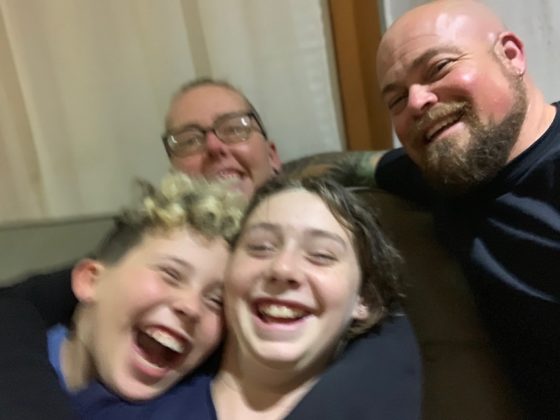There’s a strong narrative in our country that suggests queer people shouldn’t be allowed to raise children because they’ll make them queer. My response to that is: Queer people should raise children because we give them possibilities.
The other day I was caught in the kind of awkward conversation I am often caught in. My son’s uncle took him and his friends on an outing and one of the kids’ moms asked “Is he your brother?” “No” I said “he’s my son’s donor.” She got flustered. My family can appear “normal” at first, but in conversations like this it quickly devolves. Sometimes I find myself over-sharing to try to explain, but that day I just let her stammer and apologize and said, “It’s really OK.”
My family is a multigenerational queer family. We embody that in various ways. I am a queer gender non-conforming poet with weird hair and an attitude, my partner is a transgender construction worker who loves to clean and cook, my son is an 11-year-old transgender aspiring drag queen, and my daughter is a 13-year-old lesbian with a dream of a wife, a big truck, 20 dogs, and a dusty piece of land. We own the label. All LGBT and Q of it.
I’m proud of us. We are breaking the binary here in our little family, raising questions and confusing the order of things just by existing. There’s a strong narrative in our country that suggests queer people shouldn’t be allowed to raise children because they’ll make them queer. My response to that is: Queer people should raise children because we give them possibilities. I want my children to know that they can be themselves, that who they are is beautiful beyond measure, and that they are free. What they do with that is not mine to control, but it is mine to celebrate.
The truth is we are all part of multigenerational queer families. Every queer person I know has someone in their family who they grew up hearing whispers about, someone who was different. We held onto those wisps of stories as proof that we existed, that we had a place in the world even if it was only as shadows around the edges of the family. We identified with the aunts or uncles who weren’t at parties but maybe we had met once or twice, imagining that was who we might be someday. We need role models, and we need to know we are worthy.
We often don’t get those messages from the world. Recently my son’s class had an “active shooter drill” in which they prepared for a school shooting. That is the brutal reality of elementary school today. The kids were supposed to hide in the closet. A boy who has harassed my son about his gender for a year wouldn’t let him in with the other kids. So my son tried to hide in a basket. My son is only 11 but he knows that his life is worth less than the other kids, that he would be the first to die.
Last year in seventh grade my daughter told a boy who wanted her number “Sorry, I’m a lesbian.” He became obsessed with her, harassing her, saying threatening things, getting his friends to ask for her number repeatedly, sitting down next to her and putting his arm around her and physically blocking her from getting off the bus. She finally screamed at him in class and we were able to get the school to take action.
When our children first came out, my daughter at 7 and my son at 9, we thought, “They are so lucky. They won’t go through what we went through.” But in a lot of ways, homophobia and transphobia have morphed and become more sophisticated. Our family demonstrates the ways discrimination can go underground. You may be allowed to transition at school, but you won’t be treated equally. You can own your identity at a young age, but don’t expect respect. And you can be a queer family but friends will fall by the wayside when they feel like all the queerness might rub off on their kids. There will be potential danger at every turn and you will have to be constantly vigilant, ready to defend yourself and your family.
But that’s not the whole story. The lock screen on my phone is an adorable picture of my grinning daughter in a woman’s symbol T-shirt. This summer her gay uncle is sending her to an LGBTQ youth backpacking trip, and she’s so excited and nervous to take the plane by herself. Last week my son wore lipstick to the church youth group meeting, where everyone loved him as usual. There is so much hope even though there is still pain. Our family continues to insist on ourselves, every day, in every space, with love. You can’t erase my family or define any of us out of existence.
Dani Gabriel is a poet, writer, and teacher, the author of “Sam not Samuel” (Forthcoming, Penny Candy Books), “The Woman You Write Poems About” (Civil Defense Press) and coauthor of “Molotov Mouths” (Manic D Press). She holds a BA from UC Berkeley in Peace and Conflict Studies and an MFA from Mills College in Creative Writing. Her work centers around an obsession with possibility: the possibility that we can heal the world, the possibility that we can heal ourselves. She looks at themes of queerness, faith, trauma, justice, and family with curiosity and depth. For 20 years she has been organizing and creating projects around justice issues. She is a postulant for the Diaconate in the Episcopal Diocese of California, aspiring to ordination and service in the church and community. She works as a writing teacher throughout the Bay Area. Learn more about her work at www.allthepossible.com.
This piece is co-published with Family Story, a think tank founded to recognize, validate, and protect the many ways individuals form and re-form families.
Other Links:

